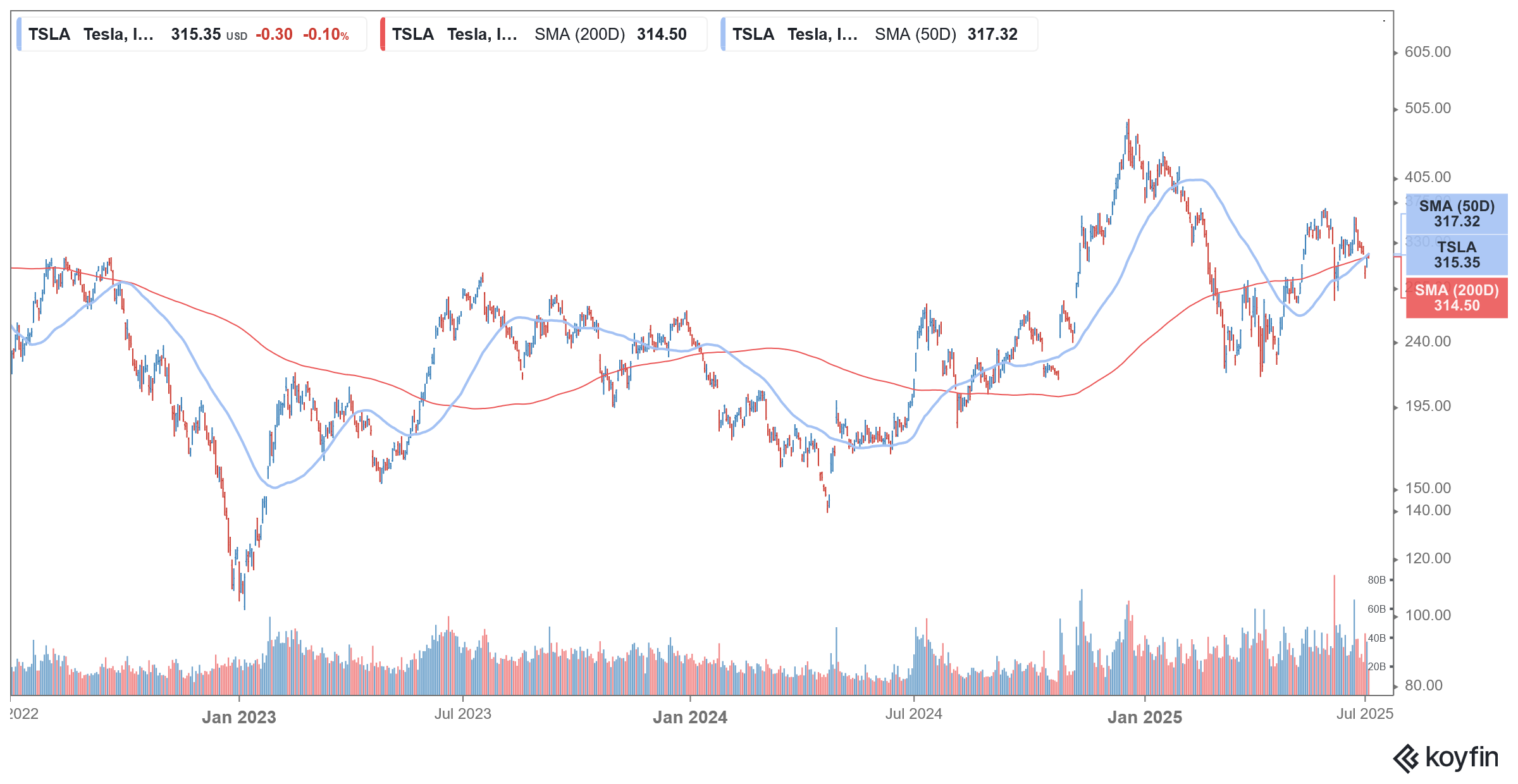Elon Musk Joins Criticism of Trump’s Tax Bill and Vows to Float New Political Party
Please note that we are not authorised to provide any investment advice. The content on this page is for information purposes only.
Tesla CEO Elon Musk, a fierce critic of President Donald Trump’s One Big Beautiful Bill Act (OBBBA), has backed Sen. Rand Paul, R-Ky., who was among the few Republicans who dissented with the bill.
Musk supported Paul’s tweet that said, “The Big Not-So-Beautiful Bill has officially passed both chambers. Despite a few conservative provisions, it explodes the deficit in the near term.”
Table of Contents
Musk Has Been Critical of Trump’s Tax Bill
Notably, Musk headed Trump’s Department of Government Efficiency (DOGE) until May and was tasked with eliminating “wasteful” government expenses. However, the bonhomie between Musk and Trump ended shortly after the world’s richest person left the White House.
The feud started with Musk criticizing Trump’s tax and spending bill, but soon got ugly. The Tesla CEO claimed that President Trump’s name is mentioned in the Jeffrey Epstein files and boasted that if not for him, Trump wouldn’t have won in the 2024 elections.
Trump responded sharply, accusing Musk of going “crazy” and threatening to terminate government contracts and subsidies for Musk’s companies like SpaceX and Tesla. However, soon enough, Musk expressed “regret” about some of his posts targeting Trump without specifying which ones.
Trump’s Tax Bill Will Add to Budget Deficit
Musk has said that he is against OBBBA as it would add to the national debt and undo the work he did at DOGE. He called it “DEBT Slavery Bill” and stressed, “Every member of Congress who campaigned on reducing government spending and then immediately voted for the biggest debt increase in history should hang their head in shame!”
The billionaire, who was the biggest financial backer of Trump in his election, vowed to unseat Republicans backing the bill.
EV Tax Credits to End in September
Meanwhile, many believe that Musk’s opposition to the bill is at least in part due to it ending the electric vehicle (EV) tax credit of $7,500. The credits, which helped make electric cars affordable for many Americans, would be terminated after September.
Trump has also said that Musk turned against him because the administration is doing away with EV-friendly policies that benefited Tesla. “I took away his EV Mandate that forced everyone to buy Electric Cars that nobody else wanted (that he knew for months I was going to do!), and he just went CRAZY!” said the President in a social media post last month.
Trump’s Energy Policies Favor Fossil Fuels
Notably, Trump’s energy policies are a stark contrast to those of his predecessor, who doubled down on subsidies for green energy as part of the Inflation Reduction Act. Trump’s bill not only does away with EV tax credits on new and used cars, but also ends the subsidies for energy-efficient systems and EV charging equipment.
It also terminated the Greenhouse Gas Reduction Fund, which provided funding to nonprofit organizations that offered financing for community projects aimed at reducing greenhouse gas emissions.
At the same time, the bill provides subsidies for metallurgical coal mining that’s used in steelmaking. Musk had lashed out at these proposals and said on X, “Utterly insane and destructive. It gives handouts to industries of the past while severely damaging industries of the future.”
Musk Looks to Float a New Political Party
Before Trump’s bill cleared the Senate, Musk vowed to form a new political party. “If this insane spending bill passes, the America Party will be formed the next day. Our country needs an alternative to the Democrat-Republican uniparty so that the people actually have a VOICE,” he said on Twitter.
After the bill was cleared by Congress, Musk did a poll on X asking users whether the America Party should be created. In another post on X, Musk said, “One way to execute on this would be to laser-focus on just 2 or 3 Senate seats and 8 to 10 House districts. Given the razor-thin legislative margins, that would be enough to serve as the deciding vote on contentious laws, ensuring that they serve the true will of the people.”
Can Musk Actually Create a New Political Party?
If Musk indeed goes ahead and makes a new political party, he would face multiple challenges. Getting a new party on the ballot varies significantly by state, often requiring a large number of signatures or a certain percentage of registered voters. This is a time-consuming and expensive process.
Musk cannot freely spend his enormous wealth in the political party, given the federal limits. Moreover, the McCain-Feingold Act sets limits on donations to political parties, making it impossible for one wealthy individual to fully capitalize a national party.
Despite varying approval levels, party loyalties remain strong, and convincing candidates to run under a new banner and voters to switch their allegiance is a massive undertaking. The U.S. political system, often described by Duverger’s Law, naturally favors two major parties due to its “first-past-the-post” electoral system. Third parties struggle to gain traction as voters are often hesitant to “waste” their vote on candidates perceived as having no chance of winning.
Musk cannot run for US President
It’s also worth noting that under US laws, Musk cannot run for president since he wasn’t born in the country.
Overall, while Musk has the financial resources and a large public following to make a serious attempt at creating a new political party, the entrenched nature of the US two-party system, coupled with complex legal and logistical hurdles, makes the prospect of a truly successful national party extremely difficult. Experts generally agree it would be an uphill battle, requiring immense sustained effort and significant shifts in the political landscape. Musk may have a more immediate impact by using his Super PAC to influence specific races.






